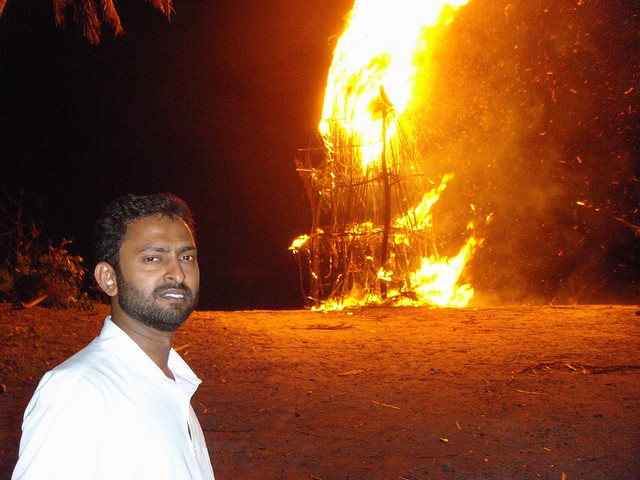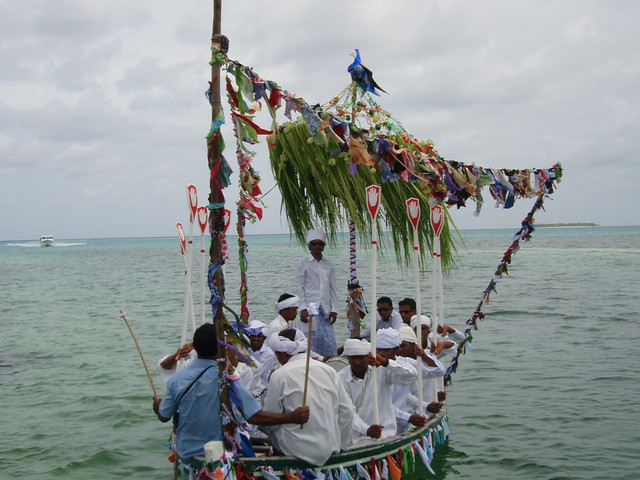By Anas Nilambur
Ramadan gets a warm reception in Maldives with numerous extraordinary rituals. In this Muslim country long before the holy month people stat preparation of welcoming ‘Rodha Mahu’, Dhivehi name for the month of fast. Men and women go to nearby uninhabited islands to collect milky white gravels, with which their courtyards are being decorated. Repainting walls is not a common practice here; however the pristine beach like appearance of house premises substitutes all other shortcomings.
All mosques, nearly 3 or 4 mosques on a small island, get new colours. Shops are filled with indispensable items for breaking fast, such as dates, apple, and watermelon are common in every shop. Preserved tins of pineapple, grapes, mango etc. are also obtainable. Among these, watermelon is the only fruit cultivated in the nation. Interestingly coca cola finds a very imperative place among these; as it plays a vital role in sort of get together, even in funerals।. Since majority of fishermen don’t go fishing during this month people usually dry a good amount of Tuna fish and use it the whole month.

Writer in front of Eid Malhi when it set to fire
Mahahifun Hafan Dhuvas, which means in Dhivehi that ‘the day of catching and eating fish’, is exclusively a Maldivian celebration being held immediately the day before holy month gets under way. It has been a practice for long ages and still carried out in the country. All Govt. officials, including their family, contribute a sum and have a delicious party. In addition, there will be some cultural entertainments presented by them. Occasionally the Red Cross takes the helm of these practices, as it has a great influence in the nation. A great majority of youth comprising children, male as well as female, goes on a picnic to some uninhabited islands, cook varieties of food and enjoy the whole day in merriment. Ali Mufeed a 90 year old national, who had been the island chief for 15 years, says that he doesn’t know how it became a part of Maldivian rituals. He adds that olden days on this particular day people used to go swimming, fishing, cooking their catch and eating to their content, since they didn’t go fishing during Ramadan, most of the family there for would have been starving during those days. He remembers that in his childhood, on the first day of Ramadan every house used to kindle seven wicks in a big brass vessel and would hang in front of their houses.
Muslims in Maldives strictly follow Imam Shafi and declares that the state’s religion is ‘Sunni Islam’. Though ladies are permitted to offer prayers at mosques except Fridays, they have no separate entrance or ablution area so that women can be seen along with gents. A few mosques keep a screen between women and men in the prayer hall, but on Eid days it would not be possible and a few rows in the back would accommodate them.
Eid days are being celebrated pompously in the country with pageantry pageants. On the last eve of Ramadan Eid-Malhi is set ablaze. Eid- Malhi is a colossal bundle of dry leaves set high above 4 wooden poles, with a flag atop. All women sing Dhivehi folk songs until the Eid-Malhi burns in to ashes. Mr . Ali Mufeedh states that it is a sequel of ancient practice, by which they used to inform the nearby islands about the appearance of new moon and mark the beginning of Eid celebrations. The Maldives conserves this practice till today as a part of their life. Next day morning, after offering Eid prayers all people engage in many sports & games, regardless of age and sex. Eid is not a celebration of food for them.

Sail with Kodia around the island
Days of Eidul Adhha are full of fun with strange activities. One among them that is Koadiya Jahum, this is a two days long activity, for which people decorate a wooden pole called Koadia with colorful cloth and glittering papers, on the top of which one replica of a large bird made up of wood and leaves, is fixed. In the afternoon, all people including small children march in procession with this Koadia all over the island singing folk songs. Koadia will be fixed in a public place in the end of this procession, normally in the sundown. At night someone destroys this Koadia secretly as planned earlier by themselves. Some others are arranged to witness this ‘anti social activity’ and next day’s sunrise begins with searching of this ‘assailant’ in all nooks and corners. All islanders run from one house to another under the pretext of ransacking for this ‘culprit’. When found out from hideout he will be taken to the place where the Koadia is kept and he is supposed to confess his ‘crime’ in public. A judge, selected by people, pronounces the sentence for this ‘goon’ on grounds of his crime. Soon after the detainee’s body will be smeared with ash and they ‘exile’ him to a nearby lone coral reef in the midst of ocean. As soon as he is exiled, some women of the island sail in a bokkura, a small rowing boat, to ‘save’ him and take back to home and all women together bathe him. There after he will be given attractive attires and ornaments. Before long he is lead to the public, ‘safeguarded’ by women in a march, there all children try to make him laugh using any method of fun. It has been a practice that, the gents will win if the ‘culprit’ laughs and women will win if otherwise. They will offer the victim of all these prolonged activities with money, food etc. In the same evening most of islanders take out a mock fashion parade in which so many men and women participate in fancy dress or in disguise. The parade ends with cultural entertainments. Altogether, Maldives creates a festive mood of Eid celebrations with a great zeal.
